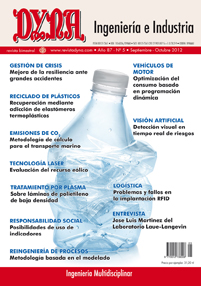FUEL OPTIMIZATION FOR ROAD VEHICLES BASED ON DYNAMIC PROGRAMMING
Keywords:
optimización, consumo de combustible, modelo cuasi-estático, minimización, Programación Dinámica, optimization, fuel consumption, quasi-static simulation, minimization, Dynamic ProgrammingAbstract
In this paper, an optimization algorithm is proposed to calculate the optimal speed of a conventional vehicle taking into account fuel consumption, travel time and the vertical profile of the road. The optimization algorithm is based on the Dynamic Programming technique and obtains the global minimum of an objective function that involves fuel and time. By setting as target a predefined travel time, the algorithm calculates the optimal profiles for speeds and engaged gears for drive across a known highway. This travel is completed according to the established time and using the minimum possible fuel amount. The optimal speed profile is obtained by concatenating different vehicle speed transitions across the route. The fuel consumption is calculated using a quasi-static model for simulate the speed transitions of the vehicle. Using data of a real road, fuel savings of up to 5.2 % are obtained without modifying travel time. The algorithm can be implemented on a vehicle improving its efficiency.Downloads
Published
2012-09-01
Issue
Section
ARTICULOS

